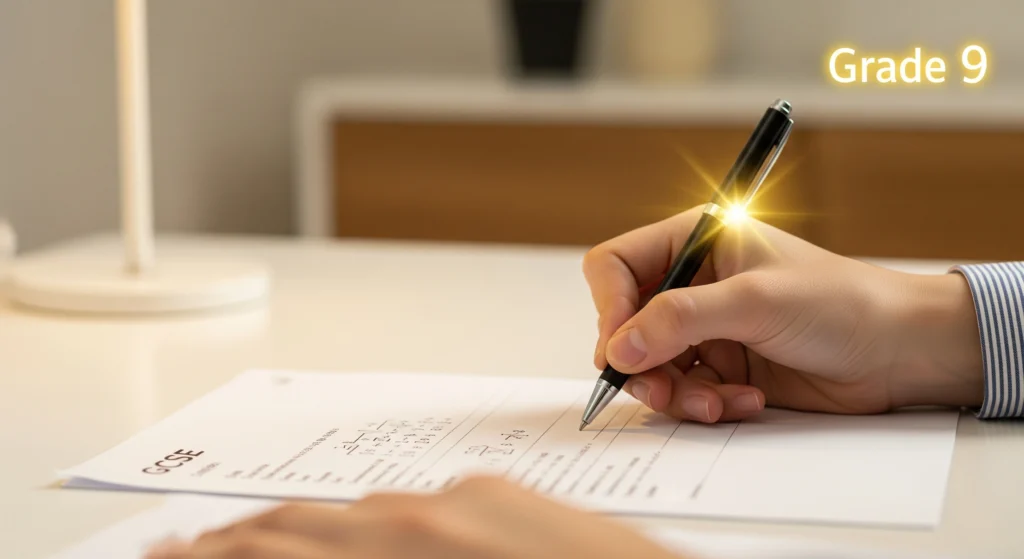How to Achieve a Grade 8 or 9 in GCSE/IGCSE Maths: Beyond the Syllabus

Introduction: The Mindset of a Top-Grade Student
Every year, a select group of students in Dubai achieve a Grade 8 or 9 in their GCSE/IGCSE Mathematics exam. These top grades are a testament to their hard work and mathematical ability. But what is it that truly separates these students from those who achieve a Grade 6 or 7?
As a Head of Mathematics who has guided countless students to these top echelons, I can tell you the secret is not simply knowing more of the syllabus. Every student aiming for the Higher tier learns the same content.
The difference lies in a set of advanced skills that go beyond the syllabus. It’s about how they think, how they approach problems, and how they perform under intense pressure. This is not about being a “math genius”; it’s about mastering a specific set of high-performance techniques.
This expert guide will reveal the four key pillars that differentiate Grade 9 students: flawless exam technique, advanced problem-solving, unshakeable accuracy, and strategic speed.
Pillar 1: Flawless Exam Technique - Thinking Like an Examiner
Top-grade students understand that the exam is a game with a clear set of rules. They don’t just answer the questions; they play the game to win every possible mark.
Mastering the Mark Scheme
As we’ve discussed in our guide to the Edexcel mark scheme, you must understand how marks are awarded. Grade 9 students actively hunt for Method (M) marks, showing every single step of their working, even for calculations they could do in their head. They know that a correct answer with no working is worthless if they make a tiny slip.
Precision in Language
They use precise mathematical language. They don’t just “move the x”; they “subtract x from both sides of the equation.” For geometry proofs, they state their reasoning for every step, citing the specific angle fact or circle theorem they have used.
Pillar 2: Advanced Problem-Solving - The Art of Application
The questions that truly differentiate at the top end are the multi-step, unstructured problems, often found at the end of the paper.
The Power of Estimation
Before they even begin a calculation, they do a quick mental estimate. “Okay, I’m multiplying two numbers a little over 10, so the answer should be a bit more than 100.” This simple check helps them immediately spot if a calculator error or a slip-up has led to a wildly incorrect answer.
The "Sense Check"
After they have their final answer, they re-read the question and ask, “Does my answer make sense in the context of this problem?” A negative length, a probability of 1.5, or a speed of a walking person being 500 km/h are all signs that something has gone wrong in the calculation.
Showing All Your Work (Again!)
This is so important it’s worth repeating. Clear, logical working not only secures method marks but also makes it far easier to spot your own errors when you are checking your paper at the end of the exam. The personalized feedback from an expert GCSE math tutor in Dubai is invaluable for perfecting this skill.
Pillar 4: Strategic Speed - Mastering the Clock
The GCSE/IGCSE Maths exam is a race against time. A Grade 9 student knows how to manage every second effectively.
Automaticity of Core Skills
They have practiced the core skills (e.g., factorizing, solving equations, basic trigonometry) to the point of automaticity. They don’t have to “think” about how to do them; they just do them, quickly and accurately. This frees up crucial mental energy and time for the harder, problem-solving questions.
The 3-Pass Technique
They don’t just work through the paper from front to back.
Pass 1 (The Easy Wins): They quickly go through and answer all the questions they immediately know how to do.
Pass 2 (The Thinkers): They go back and tackle the more complex, multi-step problems that require more thought.
Pass 3 (The Final Check): They use any remaining time to meticulously check their work, looking for the common errors we’ve discussed.
Conclusion: It's a Skill, Not a Talent
Achieving a Grade 8 or 9 in GCSE/IGCSE Maths is not a matter of innate genius. It is the result of mastering these four pillars: technique, problem-solving, accuracy, and speed. It’s about going beyond the syllabus and learning to think like a true mathematician.
This level of performance requires a strategic and dedicated approach to preparation. If you are serious about achieving a top grade, our experienced British curriculum math tutors are experts in developing these elite-level skills.